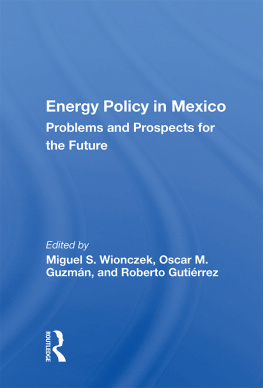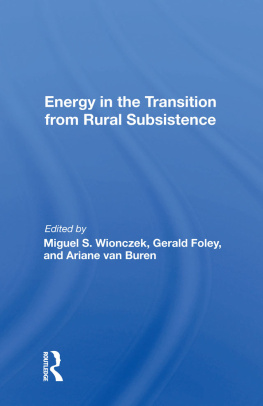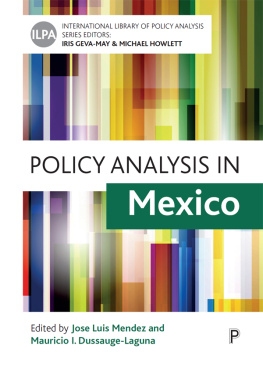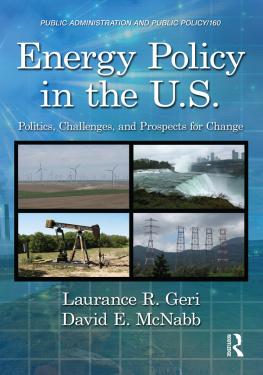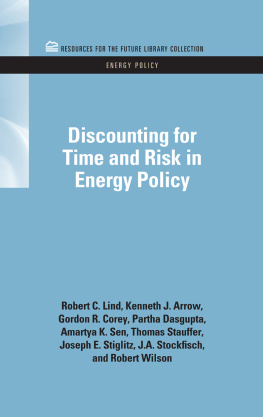First published 1988 by Westview Press
Published 2018 by Routledge
52 Vanderbilt Avenue, New York, NY 10017
2 Park Square, Milton Park, Abingdon, Oxon OX14 4RN
Routledge is an imprint of the Taylor & Francis Group, an informa business
Copyright 1988 by El Colegio de Mxico
All rights reserved. No part of this book may be reprinted or reproduced or utilised in any form or by any electronic, mechanical, or other means, now known or hereafter invented, including photocopying and recording, or in any information storage or retrieval system, without permission in writing from the publishers.
Notice:
Product or corporate names may be trademarks or registered trademarks, and are used only for identification and explanation without intent to infringe.
Library of Congress Cataloging-in-Publication Data
Energy policy in Mexico.
(Westview special studies on Latin America and the
Caribbean)
Bibliography: p.
1. Energy policyMexico. I. Wionczek, Miguel S.
II. Guzmn, Oscar. III. Gutirrez, Roberto. IV. Series.
HD9502.M62E57 1988 333.79'0972 88-14381
ISBN 13: 978-0-367-00638-9 (hbk)
The objective of the research contained in this work is to provide answers to questions about certain basic issues arising in the energy policy making process In Mexico. The most common patterns in the elaboration of energy policy observed worldwide consist of the sum of sectorial policies that tend to clash because of their particular characteristics and lack of effective coordination. Even in the best of cases, these policies culminate in separate arrangements between the various branches of the energy sector and between the energy sector and a country's energy consumers.
Do Mexico's recent efforts in elaborating and Introducing energy policy correspond to these generalized patterns? Which aspects of domestic and international economic policy either condition or restrict the development of energy policy in Mexico? What are the future prospects for Mexican energy policy considering the limitations and uncertainties brought to light during this research?
This work carefully follows the formulation and implementation of Mexican energy policy over the last fifteen years, that is, from 1970 to the present. Although each chapter was the responsibility of a different author, this book should not be viewed as a set of essays written independently. On the contrary, this work is the result-of a group effort on the part of full-time researchers in El Colegio de Mexico's Programa de Energticos and has been undertaken since the early 1980s. Because this volume is a coordinated work, particular attention has been given to avoid repetition, a common feature of anthologies and essay collections. It is clearly up to the reader to decide whether this book offers an integrated view that goes far beyond the numerous works on Mexico's oil policy available in Mexico and abroad. Undoubtedly, the attention paid to the oil industry in the past reflects its relative importance in the present production and consumption patterns of petroleum products in Mexico.
The study consists of three parts. The first part offers a general overview of the energy sector with particular emphasis on the demand for primary energy, according to end-user sector, and on planning in the different branches of the energy sector, which includes hydrocarbons, electricity, coal, nuclear electricity, and new energy sources. The second part analyzes the strategies and policies of the different areas of the hydrocarbon subsector, that is, exploration and exploitation, refining, basic petrochemicals, transport and local distribution of petroleum products, foreign trade in crude oil and natural gas, Petrleos Mexicanos finances, domestic pricing policy, the oil industry's technological capacity, and the impact of oil exploitation on the environment and society. The third part addresses energy planning between 1970 and 1988, from the first energy policy guideline proposal in 1976 to the national energy program for 1984 to 1988.
It will become clear to the reader after finishing this book that although the energy sector is of major importance to the economy of any country, energy planning is an extremely complicated exercise because of its close relationship with the rest of the country's economy and with the world economy in general, An additional complication arises with the need to elaborate energy policy on the basis of at least medium-term forecasts regarding both local and international energy supply and demand.
It seemed relatively easy to build simple planning models during the supposed worldwide shortage of crude oil, the major energy source. However, since the second half of the 1970s, when Mexico began to participate in the international market as a major exporter, building such models has not been quite as easy. Under the conditions prevailing after 1980, world oil market equilibrium became exceedingly fragile, while oil petroleum products continued to play a key role in Mexico's efforts to overcome its deep financial, economic, and social crisisa crisis brought about precisely by the country's oil-oriented economy. Under these conditions neither models nor forecasts are of much support to countries such as Mexico in energy policy design. Many factorseconomic, political, and institutionalmust be taken into account but are often very difficult to quantify.
The evidence offered in this study clearly shows that energy planning in Mexico is still at an early stage and that considerable time will go by before real coordination will be achieved between the different branches of the energy sector. In view of the experience of many industrialized and developing countries, be they net Importers or exporters of primary energy forms, one can clearly see that progress in energy programming in other parts of the world also leaves much to be desired, it Is for this reason, as well as others, that this research effort could be considered a positive contribution to the national debate at all levels on the extent of the problems still to be solved and the energy options open to Mexico between now and the end of the century.
This work would riot have been possible without the very generous cooperation of the many experts from the different branches of the energy sector, the interest of the leading figures of the sector in the research work undertaken In the Programa de Energticos, the support of the authorities of El Colegio de Mexico, and the financial assistance of the Energy Directorate at the Commission of the European Economic Communities In Brussels.


